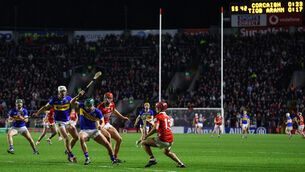Martin O’Neill’s Ireland at tipping point

That’s one way of putting it. Another would be to extend the mountain-climbing metaphor to include lead-lined boots, suits of armour and grand pianos carried on the back, a kind of ‘Guinness Book Of Records’ challenge that would render mission improbable and mission impossible almost indistinguishable.
Put it in more basic terms: with four games left after today’s fixtures — and taking as pre-ordained fact that Poland will beat Georgia and Germany will beat Gibraltar — a win for the Scots would leave Ireland in fourth place, six behind leaders Poland and five behind Germany and Scotland.












